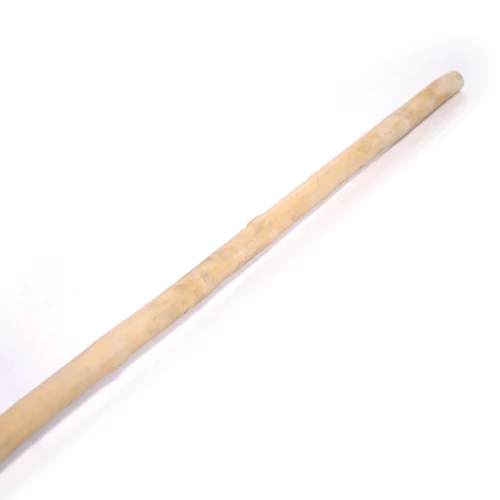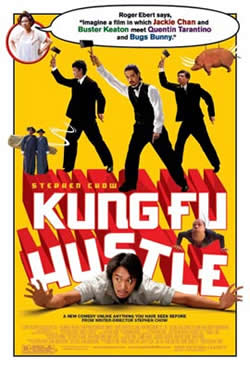 For avid fans of kung fu films - not just today's, but the films of yesteryear as well - Stephen Chow's KUNG FU HUSTLE is the best kung fu film to come out of Hong Kong in over 10 years; and if you've got a good eye and a great memory, watching it will give you a powerful sense of nostalgia. From the obvious parody of Bruce Lee to the not-so-obvious use of traditional Cantonese opera pieces (from classic 1950s B&W kung fu films), the casting of several actors who have and have not appeared in martial arts films for decades, and nods to American classics like ROADRUNNER, THE SHINING, TOM & JERRY, Charlie Chaplin, Fred Astaire and the list goes on, Chow's mix of something old, something new, something borrowed and something blue makes KUNG FU HUSTLE a perfect marriage for Western and Eastern audiences alike.
For avid fans of kung fu films - not just today's, but the films of yesteryear as well - Stephen Chow's KUNG FU HUSTLE is the best kung fu film to come out of Hong Kong in over 10 years; and if you've got a good eye and a great memory, watching it will give you a powerful sense of nostalgia. From the obvious parody of Bruce Lee to the not-so-obvious use of traditional Cantonese opera pieces (from classic 1950s B&W kung fu films), the casting of several actors who have and have not appeared in martial arts films for decades, and nods to American classics like ROADRUNNER, THE SHINING, TOM & JERRY, Charlie Chaplin, Fred Astaire and the list goes on, Chow's mix of something old, something new, something borrowed and something blue makes KUNG FU HUSTLE a perfect marriage for Western and Eastern audiences alike.
Stephen Chow spoke with kungfumagazine.com during his exhaustive, waning moments of a nationwide publicity tour. In stark contrast to the clown prince of kung fu film, Jackie Chan, who is always animated and eager to please, cracking jokes (even if you don't understand them), Chow, as Hong Kong's king of comedy, is reserved, answering with a few words while exhibiting deadpan body language. However, what the American press failed to understand was that, if you interview Chow in Chinese, he lights up and speaks quite a bit. Plus, when it's a white dude speaking Chinese, it's just a shock to him.
Whipping out my tape recorder, I play a piece of music I prepared just for him. Forty seconds later his face beams brighter than a search light along the Mexican-American border. Then I ask a question that he answers with giddy repose: "Are you kidding me? No one has ever asked me this question. (Laughs) But I admit that was pretty good. But the answer is no."
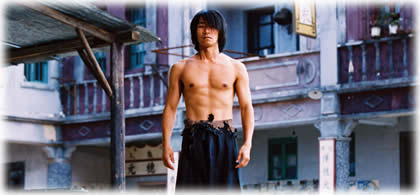
The music was the centerpiece of the 1979 kung fu film LEGEND OF A FIGHTER, directed by Yuen Wo-ping and starring Liang Jia Ren, based on the life of Huo Yuen Jia (Bruce Lee's sifu in CHINESE CONNECTION). So I asked if by some freak of nature he used the same piece of music in KUNG FU HUSTLE as a nod to Bruce playing Huo's student - a reflection of Chow's respect to Lee. After his initial comment, Chow continues, "Since I was a kid growing up watching old kung fu films, I used to listen to this kind of music a lot; it's traditional Cantonese opera, and this piece is from the 1950s. It's been so long since people have used this music in film, and to me, I feel it's very beautiful music; and I thought back then that if I ever get into film and am in a position to use this piece, I would do so. So obviously, I've kept the piece in my mind a long time. Nobody takes this music seriously. So during making KUNG FU HUSTLE, I said to myself, 'I must use it.' And so there you have it."
Set amid the chaos of pre-revolutionary China, KUNG-FU HUSTLE is the story of a small-time thief, Sing (Chow), who aspires to become a member of the sophisticated and ruthless Axe Gang, whose underworld activities overshadow the city. As Sing stumbles across a crowded apartment complex called "Pig Sty Alley" (actually reminiscent of Chow's childhood home), his comical attempts to extort money from the tenants inadvertently attracts the Axe Gang into the fray, setting off a chain of events that brings the two disparate worlds face-to-face, where the Axe gang hires a menagerie of martial arts assassins to do away with the complex's inhabitants. But the comely plebeians living in this larger than life pigpen are not what they seem to be.
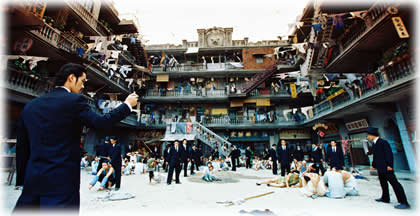
"After SHAOLIN SOCCER, one of the kind of films I've always wanted to do is my own martial arts hero film. Now, of course it's too late for me in real life to become a real kung fu master, but at least in film I can be a kung fu expert like Bruce Lee, who as you know is one of my idols, as is Jimmy Wang Yu.
"I remember seeing my first Bruce Lee film as clearly as if it were yesterday, in a run down-theater; but when Bruce came on, I was overwhelmed by the experience, my heart felt like it was going to burst, I had tears in my eyes. I wanted to be Bruce Lee. Being a martial arts expert was really my first choice and an actor second, because that is what Bruce was.
"Now, the point of Pig Sty Alley is that, in real life - even in my old neighborhood as a kid - you really just never know who knows martial arts, and someone you see everyday who looks so ordinary turns out to be a master, and this is what I bring out in the film."
Three years in the making, KUNG FU HUSTLE (in Chinese it's just KUNG-FU - HUSTLE was suggested to him by Columbia Film Production Asia) is literally loaded with cartoon-like action, with about 600 special effects shots and all done for a measly budget of $15 million. Now keep in mind that when SONY Imageworks produced a three-minute animatic reel for Warner Brothers, showing how to digitize Keanu Reeves' face onto his stuntman's body along with 40 seconds of what the fight between Neo and the 100 Agent Smiths could look like, that price tag was $10 million. So you'll be agape at the sequence where Sing takes on 100 axe men dressed in black suits and white shirts that reminiscently looks a lot like Neo's clash with the Agent Smiths in MATRIX: RELOADED. Not only is Chow's fight far superior, but it's a few thousand times cheaper.
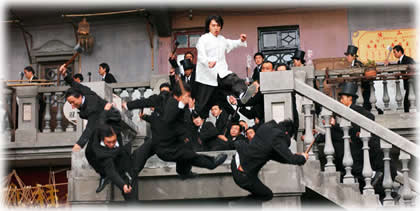
Chow says that it is indeed MATRIX that stole from the old Shaw Brothers movies. And when you get down to it, he's right. I mean, is there anything in the MATRIX films, kung fu wise, that you haven't seen before...? No.
"Let's face it," says Chow. "In Hong Kong films, the ideas of fight scenes of one fighting many, and by many I do mean up to 100 attackers, is old (Chang Cheh's films GOLDEN SWALLOW (1967) and THE DUEL (1971) come to mind) and has been around for a long time. And when you get down to it, in any fight, it's either one against many, one on one or many against many, and there are no other options. For KUNG FU HUSTLE, I just wanted to use old concepts of the classic Shaw Brothers kung fu films, so this is not a MATRIX idea. I had no intention to use the MATRIX scene. (Grins) So maybe that is the parody."
In selecting the cast of martial arts characters, Chow again dipped into the past legends of Hong Kong cinema.
Playing the LandLord is Yuen Hua, one of the famed "Seven Little Fortunes" and a fellow opera brother of Jackie Chan and Sammo Hung. He is perhaps best known to American kung fu film fans for his slick-haired, deranged smiling character from EASTERN CONDORS, which he reprised in DRAGONS FOREVER. Hua was one of Bruce Lee's stuntmen and in fact was one of the Japanese characters Lee beats up in the Shanghai Park scene from CHINESE CONNECTION.
 Yuen Qiu (pronounced Cheo), a star of the 1970s who retired from filmmaking over 20 years ago, was convinced by Chow to come out of retirement to play Hua's wife the Landlady. At age seven, as Kan Chia Fung, she attended the same Beijing Opera School as Yuen Hua and was given the name Yuen Qiu by Master Yu Jim Yuen. Qiu actually debuted in two films featuring a young Jackie Chan, the title role in POLICE WOMAN (1971) and a non-action role in NOT SCARED TO DIE (1972). She went on to be a Bond Girl in MAN WITH A GOLDEN GUN, was a feature fighter in Lee Van Clief's THE BLACK DRAGON'S REVENGE (1975), then, after starring in numerous Korean martial arts movies alongside Dragon Lee under the moniker of Phoenix Kim, she retired. Why her?
Yuen Qiu (pronounced Cheo), a star of the 1970s who retired from filmmaking over 20 years ago, was convinced by Chow to come out of retirement to play Hua's wife the Landlady. At age seven, as Kan Chia Fung, she attended the same Beijing Opera School as Yuen Hua and was given the name Yuen Qiu by Master Yu Jim Yuen. Qiu actually debuted in two films featuring a young Jackie Chan, the title role in POLICE WOMAN (1971) and a non-action role in NOT SCARED TO DIE (1972). She went on to be a Bond Girl in MAN WITH A GOLDEN GUN, was a feature fighter in Lee Van Clief's THE BLACK DRAGON'S REVENGE (1975), then, after starring in numerous Korean martial arts movies alongside Dragon Lee under the moniker of Phoenix Kim, she retired. Why her?
"I had been looking for this Landlady character for a long time," Chow admits. "She came to the audition with a friend, and when she lit a cigarette, I saw it and thought, 'Wow, that's the Landlady.' She actually reminded me of the landlady we had as a kid. So after she did a few more smoking poses, I talked to her to see if she'd be interested in the part. She didn't want to do it at first but eventually agreed.
"Now to me, all landladies need to be fat; it's just what they look like in Hong Kong. And so I asked her to put on weight, and she did, somewhere between 30-40 pounds. It wasn't easy for her, and I put her on a high protein diet like the Sumo wrestlers. She ate a whole lot of food. And now, after the film, she has thinned down."
Her efforts were rewarded with a Hong Kong Film Award nomination for Best Actress. In the film, she was also a master of the fabled "Lion's Roar kung fu." This is a real martial art, according to Chow, who explains, "From what I understand, during fighting you use these loud roaring sounds to distract the opponents. Of course it's some kind of qigong. The sound and the voice are really loud, and people who hear it can get internal injuries. This is what I understand about the technique."
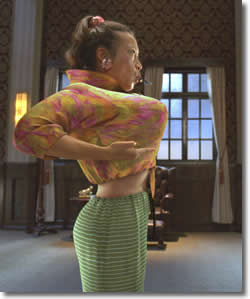 What Chow didn't know was that the Lion's Roar was a kung fu style created by the Tibetan Monk Ah-Dat-Ta around 1440. Ah's kung fu, however, is not so much based on the physical act of sound so much as the philosophical implication of Buddha. When a lion roars, all will listen, just as when Buddha roars (speaks), people will listen. One reason Chow will be a successful director is that when someone white tells a Chinese director about something Chinese, they scoff at it or say, "Oh yeah, I know this," when indeed they don't. Chow instead listens intently and asks for information on the history. He is a man with an open mind.
What Chow didn't know was that the Lion's Roar was a kung fu style created by the Tibetan Monk Ah-Dat-Ta around 1440. Ah's kung fu, however, is not so much based on the physical act of sound so much as the philosophical implication of Buddha. When a lion roars, all will listen, just as when Buddha roars (speaks), people will listen. One reason Chow will be a successful director is that when someone white tells a Chinese director about something Chinese, they scoff at it or say, "Oh yeah, I know this," when indeed they don't. Chow instead listens intently and asks for information on the history. He is a man with an open mind.
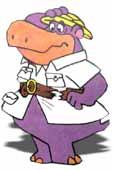 Interestingly, and in keeping with the cartoon theme, when Yuen Qiu uses her Lion's Roar kung fu, she comes across like Peter Potamus's patented "Hippo Hurricane Hollar" from Hanna-Barbera's 1964 PETER POTAMUS cartoons.
Interestingly, and in keeping with the cartoon theme, when Yuen Qiu uses her Lion's Roar kung fu, she comes across like Peter Potamus's patented "Hippo Hurricane Hollar" from Hanna-Barbera's 1964 PETER POTAMUS cartoons.
Rounding out his martial arts characters in the film are the Tailor, master of the Iron Chain Fist, played by Chiu Chi Ling, who often played a villainous eagle claw or Hung Gar fighter in many films, including some early Chan movies (in real life he owns a Hung Gar school in San Francisco); Coolie, master of Dan Tui kicking, played by Xing Yu, who started martial arts training at age 10 in the Shaolin Temple; Donut, expert in the Eight Trigram Staff, portrayed by Dong Zhi Hua, a famous opera star in China who started out in film as one of director Chang Cheh's leading men in the mid-80s; evil Harpist #2, played by Jackie Chan's former assistant and Shaw Brothers fighter Fung Ke An; and finally the main villain of the film, The Beast, master of the Toad Skill of Kunlun, played by Liang Xiao Lung, once ranked with Bruce Lee and Jackie Chan as one of Hong Kong's Three Little Dragons, but blackballed into retirement by the industry over 15 years ago for accepting an invitation from the Communist Government to visit Beijing. Of note, the last time we saw this Toad kung fu in film was when Alexander Fu Shen's character in the BRAVE ARCHER series was taught the technique by Wang Lung Wai's character.
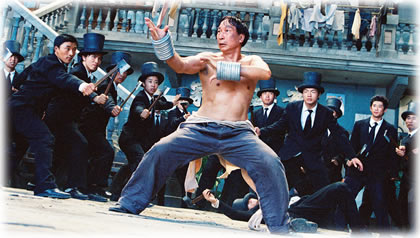
To do the fights and the action, Chow initially brought in Sammo Hung, who was later replaced by Yuen Wo-ping. Chow often works with Chen Xiao Dung (Ching Siu Tung), who I consider the best wire-fu fight director/choreographer around. So why Wo-ping in this film?
Chow elaborates, "To be honest, I really wanted to use Wo-ping in the beginning, but he didn't have time to do the film; so I asked Sammo, who is also one of the best around. But then later on Sammo had health problems, so then I asked Wo-ping. And I wanted him because - you've seen the film - I wanted to use the old traditional Chinese style of kung fu fighting; I guess if you'll forgive the misuse of the word, to have more realistic fights, and by that I mean not so much wire-work kind of fights, but gritty stuff."
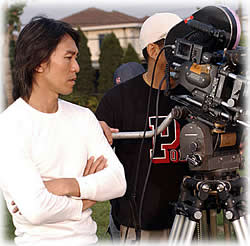 Let's hope that SONY Pictures Classics does a better job with KUNG FU HUSTLE than Miramax did with SHAOLIN SOCCER, because KUNG FU HUSTLE is definitely worth the watch and should be viewed on a large screen. At least there are two things going for it. It's been left in Chinese with subtitles, and it's opening on the advertised date, April 8th in LA and NY, and then in over 2000 theaters on April 22nd...this I was told by Mike Barker, the Co-President of SONY Pictures Classics...his word is on the line.
Let's hope that SONY Pictures Classics does a better job with KUNG FU HUSTLE than Miramax did with SHAOLIN SOCCER, because KUNG FU HUSTLE is definitely worth the watch and should be viewed on a large screen. At least there are two things going for it. It's been left in Chinese with subtitles, and it's opening on the advertised date, April 8th in LA and NY, and then in over 2000 theaters on April 22nd...this I was told by Mike Barker, the Co-President of SONY Pictures Classics...his word is on the line.
About
Craig Reid :
![]() Written by Craig Reid for KUNGFUMAGAZINE.COM
Written by Craig Reid for KUNGFUMAGAZINE.COM
![]() Print Friendly Version of This Article
Print Friendly Version of This Article











